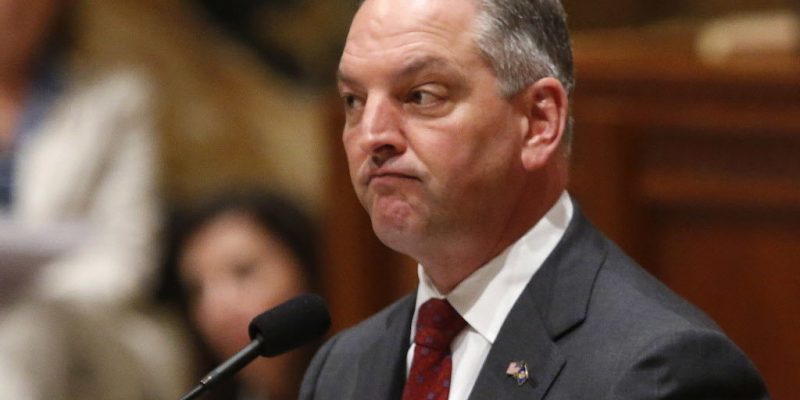Louisiana Gov. John Bel Edwards recently penned an op-ed, “Here’s how Louisiana is making progress,” touting economic successes in the Pelican State. The column is causing ire among his critics.
Edwards wrote in the column published by The Advocate that his leadership has helped turn around the state’s failing economic climate, which was facing a $2 billion budget shortfall that he claims he inherited from his predecessor. The state’s fiscal 2018 $300 million surplus exists “because Louisiana businesses are doing better, more Louisianans are finding work, and the improving economy has allowed corporate tax receipts to outpace expectations.”
Edwards has repeatedly argued that Medicaid expansion created more than 19,000 jobs and more than $3 billion in economic activity since 2016, a claim the Pelican Institute refutes. And according to the most recent Bureau of Labor Statistics data, Louisiana’s workforce shrank over the past year.
Edwards also claimed, “Since I’ve been governor, the unemployment rate has fallen from a high of 6.2 percent to its current rate of 5 percent. Republicans, Democrats, and Independents did all of that, and we still reduced the tax burden on the people of Louisiana by nearly $600 million.”
Critics point out that his claims come after he pushed through a seven-year tax increase and has done little to wipe out Medicaid fraud in the state, which cost taxpayers more than $2 billion. The governor did so while using “scare tactics,” Attorney General Jeff Landry said, by threatening to evict seniors and saying there would be “no LSU football” and “no TOPS [scholarship] funding.”
By taking “political hostages to advance his liberal agenda,” Landry said, Edwards continues to ignore the massive amount of taxpayer-funded Medicaid fraud exposed by the Legislative Auditor’s Office (LAO). The LAO found that at least 83,000 individuals falsified their eligibility to receive Medicaid benefits that they otherwise would have not received. This was only one type of fraud, Landry points out, which costs taxpayers $498 million every year.
Landry also takes issue with the Edwards’ “bipartisan” claim, explaining that the Senate rejected HB 163, which would have made it easier for the Medicaid Fraud Control Unit (MFCU) to investigate Medicaid recipient fraud. Additionally, when the House requested that Medicaid fraud legislation be included in the 3rd Special Session in June, the governor denied the request.
“Why did the governor choose to send out 40,000 notifications to the vulnerable elderly and not 83,000 notifications to the welfare fraudsters?” Landry asked. “The answer is simple: it is easier for the governor to play political games than it is for him to address the real problem.”
The LAO’s audit found that more than $2 billion was spent on Medicaid services that the state Department of Health (LDH) could not confirm were actually performed or covered by Medicaid. The lack of oversight enabled claims to be processed by false providers; taxpayer money funded billable hours that were mathematically impossible; deceased people received benefits; and several other scams were uncovered by the MCFU.
“One can only conclude that by any metric, Medicaid expansion has put an extra burden on Louisiana taxpayers in 2017 when we only paid 5 percent of the cost,” Lafayette-based CPA Steve Gardes said. “In 2020, we will pay 20 percent of the cost. Since ‘we taxpayers’ also pay federal income taxes, that extra burden could become quite heavy.”
Gardes notes that Louisiana’s portion of Medicaid costs is $3.3 billion. It is projected to reach $6.1 billion by 2026, representing a $2.8 billion per year increase.
Sen. Conrad Appel, R-Metairie, argues that Edwards’ policies have neither improved the state’s economic status nor responsibly used taxpayer money. Conservatives, he argued, “believe that responsible use of taxpayer money is inherent to good government.” Wasting money and continuing the status quo, he argues, is not.
According to a Pew Charitable Trusts analysis, Louisiana’s budget relies the most on federal dollars. Before Medicaid expansion, 42.2 percent of the state’s budget came from federal dollars.
Bill Bergman, Truth in Accounting’s (TIA) director of Research, told Watchdog.org, “Looking across the 50 states, we see a tendency for states with higher shares of Medicaid enrollment in total population to have higher taxpayer burdens, and slower economic growth. Coincidentally, or not, Louisiana ranks near the bottom third of states on TIA’s Taxpayer Burden measure, and has had sub-par performance in GDP per capita in recent years.”
This article was first published by Watchdog.org.
Advertisement
Advertisement

